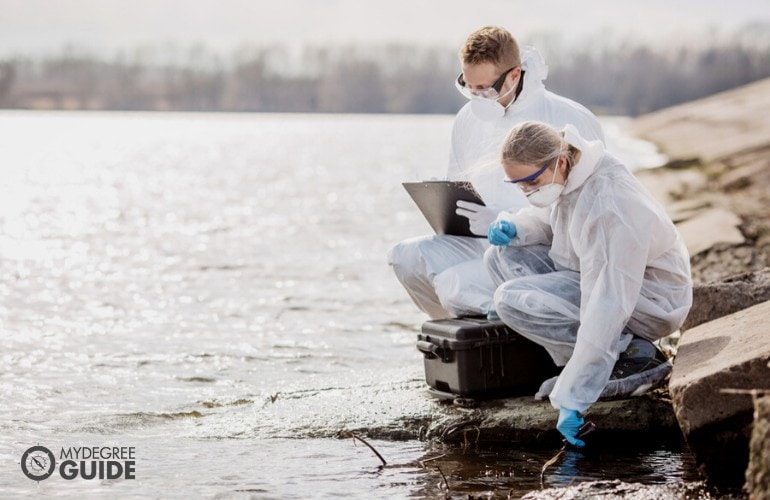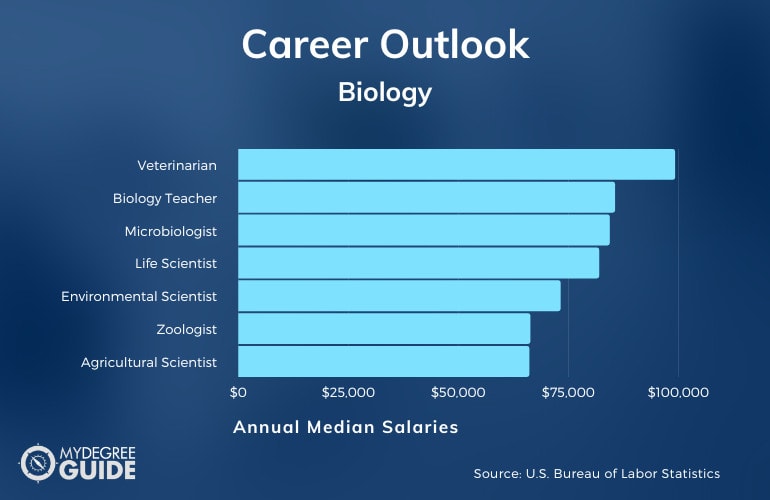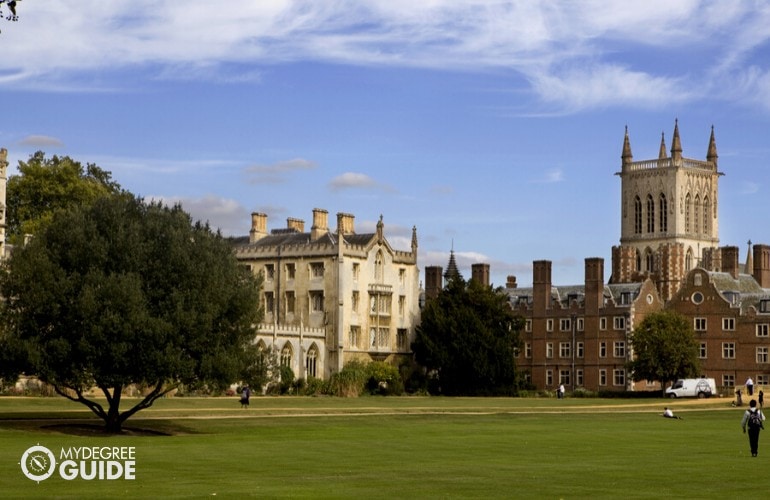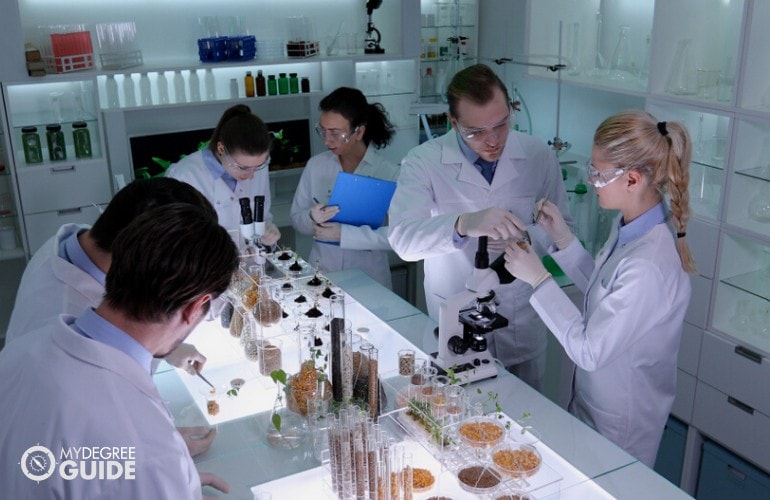We’ve identified 10 accredited accelerated biology degree online programs. Compare schools and learn about possible concentrations.

How would you like a degree in life? That’s what an accelerated biology degree is. An online biology degree is a degree in the study of life from molecules to animal and plant communities.
Editorial Listing ShortCode:
There are many different areas of life to study and just as many biology careers that you can pursue. You can focus on the smallest living organisms, such as bacteria, or you can look at animals, plants, and humans.
Universities Offering an Accelerated Biology Degree Online
Methodology: The following school list is in alphabetical order. To be included, a college or university must be regionally accredited and offer degree programs online or in a hybrid format.
1. Arizona State University – Tempe
Arizona State University is a state-run university with a 661-acre urban campus in Tempe, Arizona. It was established in 1885 as a normal school for training teachers, and it only had 33 students at first. Today, ASU-Tempe is ASU’s largest campus, with an enrollment that exceeds 70,000 students. They play as the “Sun Devils” in the NCAA Division I.
- Bachelor of Science in Biological Sciences
ASU is accredited by the Higher Learning Commission.
2. Bellevue University
Bellevue University is a privately-operated university with a suburban campus situated in Bellevue, Nebraska. This non-profit school was founded in 1966 with a focus on adult education and outreach. A vast majority of its undergraduates are over 24 years old.
The school’s current census has its enrollment exceeding 10,000 students. They play as the “Bruins” in the NAIA, NSAA, and MCAC.
- Bachelor of Science in Biology
Bellevue is accredited by the Higher Learning Commission.
3. Excelsior College
Excelsior College is a privately operated university with headquarters in Albany, New York. It was founded in 1971 and, since its inception, has focused on adult learners who held jobs.
The school’s curriculum is non-traditional, and it relies heavily on transfer credits as well as online and distance learning. Its current enrollment exceeds 30,000 students, 27,000 of which are undergrads.
- Bachelor of Science in Natural Sciences – Biology
Excelsior is accredited by the Middle States Commission on Higher Education.
4. Florida International University
Florida International University is a state-operated research university in Miami, Florida. It has two campuses, the University Park and the Biscayne Bay Campus. This university was founded in 1965, and it opened its doors to 5,667 students in 1972. Today, its enrollment is more than 10 times its initial student census.
They play as the “Panthers” in the NCAA Division I.
- Bachelor of Arts in Biology
FIU is accredited by the Southern Association of Colleges and Schools.
5. Logan University
Logan University is a privately-run university that operates a 112-acre campus in Chesterfield, Missouri. This Special Focus institution was established in 1935 with only seven students in total in its first six months.
Today, the school’s enrollment is about 1,400 students. Doctoral students and postgrads make up the majority with about 700 and 550 students, respectively. The students in this university don’t compete in athletics.
- Bachelor of Science in Human Biology
Logan is accredited by the Higher Learning Commission.
6. Salem University
Salem University has provided a variety of degree programs with a strong foundation in the liberal arts since its founding in 1888. They offer a ‘one course per month’ format of learning, which allows students to focus on one class at a time, which is both accessible on-campus and online.
Learning at Salem is a community endeavor. Students are given strong support from teachers and advisors to ensure success in their degree. They offer a career-relevant curriculum that prepares learners as they move further in their professional and personal development.
- Bachelor of Science in Biology – Human Nutrition & Performance
- Bachelor of Science in Biology – Physiology & Exercise Science
Salem has been accredited by The Higher Learning Commission.
7. University of Florida
The University of Florida is a state-operated university with a 2,000-acre suburban campus in Gainesville, Florida. It traces its origins to the founding of its earliest predecessor institution in 1853. It is a land, sea, and space-grant university. Its current enrollment is about 56,000 students, more than 3,500 of which are online.
They play as the “Gators” in the NCAA Division I.
- Bachelor of Arts in Biology
UF is accredited by the Southern Association of Colleges and Schools.
8. University of West Georgia
The University of West Georgia is a state-operated university that manages a 644-acre college town campus in Carrollton, Georgia. It was founded in 1906 to teach agricultural and mechanical sciences to young rural students. Its current enrollment exceeds 13,700 students, about 2,600 of which are postgrads.
They play as the “Wolves” in the NCAA Division II.
- Bachelor of Science in Biology
UWG is accredited by the Southern Association of Colleges and Schools.
9. Western Governors University
Western Governors University is a privately-operated, non-profit academic institution. This online university was established in 1997 by the Western Governors Association. The first seed fund was from the government, but it was quickly able to sustain its own operations.
Today, all of its students are online, and its current enrollment exceeds 110,000 students, more than 80,000 of which are undergrads.
- Bachelor of Science in Science Education – Secondary Biological Science
WGU is accredited by the Northwest Commission on Colleges and Universities.
10. Westfield State University
Westfield State University is a state-managed university with a residential campus in Westfield, Massachusetts. It was established in 1838 as the pioneering American university that welcomed all genders, races, economic classes, and creeds.
The school’s current enrollment has the census at about 5,500 students, about 4,900 of which are undergrads. They play as the “Owls” in the NCAA Division III.
- Bachelor of Science in Biology
WSU is accredited by the New England Commission of Higher Education.
Types of Accelerated Biology Degree Online Programs
If you can name an area of life that you think would be interesting to study, there is probably a biology major to match it! Your degree would be a Bachelor of Science, but your major could be in:
- General Biology
- Biochemistry and Molecular Biology
- Biomedical Sciences (Pre-Med)
- Biopsychology
- Cell & Molecular Biology
- Chemistry
- Environmental Biology
- Forensic Science
- Zoo & Wildlife Biology
- Zoology (including Pre-Vet)
You may get a degree in zoology. Or study how diseases spread and how they could be prevented. Or you can focus on wildlife. The natural environment. Preservation and conservation.
A degree in biology may get you a career in almost any field. According to the Bureau of Labor Statistics, job opportunities are expected to grow by 5% in the next ten years, with 68,200 new jobs created. There is an increased demand for experts in the sciences that includes biomedical research, energy management, and environmental protection.
Did you also know that the average yearly salary for a career following a biology degree is $65,000? That’s about $24,000 more a year than the national average.
Accelerated Biology Degree Programs Overview

Biology is not a subject that is all textbook. The best way to study life is to get your hands dirty. A biology degree will often involve experiments, labs, research, and reporting. There may even be fieldwork involving studying and interacting with large or small creatures.
Your study may be filled with exploring life forms in their natural habitats and working in a laboratory with microscopes and slides. You may learn critical thinking skills, group work and how to communicate your scientific findings. Every biology degree might give you a basic grasp of biology principles, but you can then specialize in classes like:
- Animal biology and physiology
- Anatomy
- Biophysics
- Botany
- Cell and molecular biology
- Computational biology
- Ecology and evolution
- Environmental biology
- Forensic biology
- Genetics
- Marine Biology
- Microbiology
- Molecular Biosciences
- Natural Science
- Neurobiology
- Organic Chemistry
- Parasitology
- Physiology
- Zoology
Your classes may change depending on what area of biology you are specializing in, but each class you take can help you better understand the natural world around you.
Careers with an Accelerated Biology Degree

You will need to decide how far you want to go with your biology degree. A bachelor’s degree in biology may start you on a career as a biological scientist, biology teacher, science technician, or clinical laboratory technician. But if you go on to graduate school, you may also become a veterinarian, medical doctor, or professor.
Research is one of the most popular careers in biology and can cover medical specializations such as health, disease, neurology, genomics, microbiology, and pharmacology.
Healthcare, as it involves human life, employs a vast amount of biology degree holders. To be a healthcare professional like a doctor, nurse, or lab tech, you will need additional training, but your biology degree can help set you up with a good foundation.
Don’t forget all the other living organisms in our world. An environmental biologist studies, researches, and conserves these important living things. You may be hired by charities, not-for-profit organizations, the government, or various companies as a:
- Aquatic biologist
- Conservation biologist
- Ecologist
- Marine biologist
- Zoo biologist
According to the Bureau of Labor Statistics, some careers in the biology field include:
| Careers | Annual Median Salary |
| Veterinarian (requires further education) | $99,250 |
| Biology Teacher (requires certification) | $85,600 |
| Microbiologist | $84,400 |
| Life Scientist | $82,000 |
| Environmental Scientist | $73,230 |
| Zoologist | $66,350 |
| Agricultural Scientist | $66,120 |
| Conservation Scientist | $64,020 |
| Foresters | $63,980 |
| Biological Technician | $46,340 |
If you’re eager to start studying for one of these careers, an accelerated biology program may be exactly what you need.
Accelerated Biology Degree Programs Offer Year-Round Admissions

There are seasons and stages to all parts of life but life never actually stops. Neither do admission dates. You may start your classes for your degree at any point in the year. This might speed up your degree completion by months!
Instead of waiting for the next semester to start, you could sign up for classes now. By the time the next cadre of on-campus students move in, you might be done with a semester (or more!) of classes.
Accelerated Online Biology Classes

Accelerated classes are like taking classes dipped in Miracle-Gro. You take the same material and complete the same assignments as a traditional class. Accelerated classes give you a date for when your class will start and when you need to complete it. Like a typical growing season has a start date and an end date. But you may complete the classes twice as fast as usual.
Often, students will register for a 16-week class because they think there is no other option. You may, however, have the option of registering for an online accelerated class that will give you the same credit in 6-8 weeks.
Instead of booking time off work to attend a traditional class, you may complete the classwork on your lunch break, in the evenings and on the weekends. You make the class work for you! And you might finish in half the time, so you may then take another class right away. In the space of 16 weeks, you may complete at least 6 credits without sitting in class for any of it.
3 Ways to Accelerate Your Biology Degree Even More

Nature can only move as fast as it is programmed to, but there are elements that may speed or slow down how fast nature moves. Your biology degree will often require you to earn 120 credits, but there are elements that you may put into play that can help you earn those credits quicker.
1. Test Out of College Classes (Up to 1 Year)

You can not change the laws of nature, but you can change your idea of how to earn credit. Credit does not need to be earned by taking a class. You may earn the same credit you would get in class through a process called Credit by Exam.
You are looking at potentially earning a whole YEAR of class credit through this program. That is up to 30 credits. The College Level Examination Program allows you to register for an exam, study (if necessary), then go to the exam center and take the exam. If you pass with at least a 50%, you may earn full credit for courses like:
- American Government
- American Literature
- Chemistry
- Composition
- Introductory Biology
Depending on your school’s policies, you may complete your whole freshman year of classes by taking 10 CLEP exams. According to CLEP’s website, current exams last 90 minutes and contain about 100 questions. The current exam cost is $89, but your local testing center may charge a small fee as well. If you pass all 10 of your exams, you might earn up to 30 credit hours without stepping foot in a classroom.
2. Get College Credit for Your Life and Work Experience

Another trick is to be granted credit for your life and work experience. Most universities have programs that will give you credit for your work experience. If it isn’t obvious if your school does so, then ask your program or school advisor.
How it works is that you pull together in a portfolio the details about your job training, military experience, credentials, and experiences. You detail which classes you have already met the outcomes for and how you did that. You submit this portfolio along with your one-time fee, and the school might potentially present you with up to 15 credits.
3. Stay Continuously Enrolled with the Max Course Load

You could just take 15 credits a semester and earn 30 credits each year, thus finishing in 4 years. Or you could maximize all three semesters. Yes, you may earn credit in fall, winter, and summer semesters. You might earn 18 (not 15!) credits each semester.
This trick may earn you an extra 24 credits per year, letting you finish up to 2 years earlier.
Transferring Your Existing College Credits

Don’t forget that you can plunk any college credit you have into your current degree plan. Check first to make sure that:
- Your credit is from an accredited college
- You earned at least a C in the class
- The credit fits your biology degree
If you can answer yes to the first 2 points, then don’t worry about the 3rd. There is usually a spot for electives that you can fit any college credit into. Use that credit!
Lower Tuition Costs

If you want to save money on your degree, then don’t take as many classes. Taking classes is not the only (or best) way to earn credit.
Each class you take may cost you from $1,000-$1,750. That adds up quickly. Remember that you might get 15 credits through Credit for Prior Learning. Earning 15 college credits by going to class would cost you at least $5,000.
Not only may Credit by Exam and Credit for Prior Learning save you $10,000s of dollars, but you are also saving yourself up to 2 and ½ years of classroom work. Time is money, and each year that you are in full-time school, you are still needing to pay for your room and board.
The sooner you finish, the sooner you may start working, which will have you earning money from your degree instead of spending money on your degree.
The other way to lower your costs is to take advantage of financial aid opportunities. Start by filling out the Free Application for Federal Student Aid (FAFSA) to see what grants and loans you qualify for. Then, research scholarships from universities and private organizations.
Biology Degree Accreditation

Don’t waste your time or money on fake degree programs. The tricks you learned here are valid and legitimate. You can typically use these techniques with any school. But you need to make sure that the school you are attending for your biology degree is accredited.
Accreditation is the checkmark that your college or university earns after being reviewed by an accrediting body. Accreditation gets your degree recognized by employers, graduate schools, and certification programs. Either regional or national accreditation will meet your needs.
The big names you can look for in national accreditation are:
- American Society for Biochemistry and Molecular Biology
- Accrediting Council for Independent Colleges and Schools
- Council for Higher Education Accreditation (CHEA)
- Distance Education Accrediting Commission (DEAC)
Your school may also be accredited by one of several regional accrediting boards.
Grow Your Education Now!

If you start now, you might finish your biology degree in just 18 months. Then you may start dropping your resume at the zoo. Or at the conservation office. The genomic research company. If you are interested in earning an advanced degree, it may be worth noting that a number of universities offer various programs leading to an online masters in biology.
The first steps are to narrow down which schools you want to attend, apply to them, and start researching financial aid opportunities.
